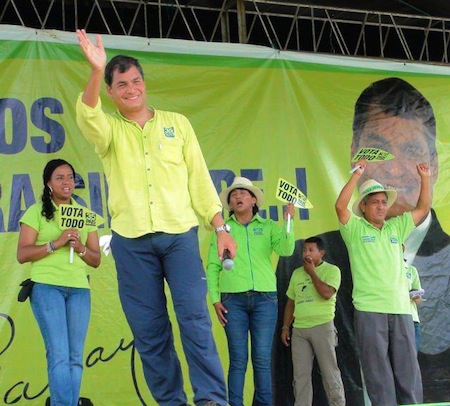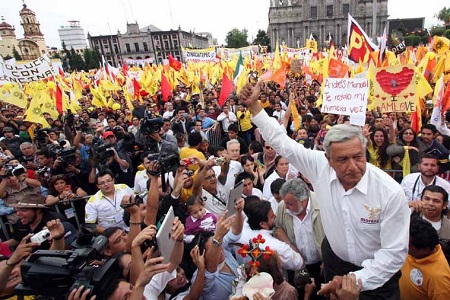

We have some more final numbers for each of the key Mexican races from Sunday’s election, and in each case, it suggests that Mexico was warier than polls suggested about returning the Partido Revolucionario Institucional (PRI) — the party that governed Mexico for 71 years until 2000 — to power. Furthermore, the results suggest Mexicans, under the right circumstances, may be turning to the left and, above all, the leftist Partido de la Revolución Democrática (PRD) may, like so often in its recent history, have lost a key opportunity to win real power in Mexico.

When you look to the congressional races and the key gubernatorial races too, there’s reason to believe that at each turn, the PRI hasn’t won quite the sweeping victory that it once expected, and in many ways, the PRD and even the center-right, ruling Partido Acción Nacional (PAN) over performed from expectations.
Presidential Election. Enrique Peña Nieto, the PRI’s candidate has won with just 38.15% to 31.64% for the PRD’s Andrés Manuel López Obrador, the candidate of the Partido de la Revolución Democrática (PRD). The candidate of the PAN, Josefina Vázquez Mota, trails with 25.40%. Gabriel Quadri de la Torre of the Partido Nueva Alianza (PANAL), won 2.30%. Vázquez Mota managed to win a handful of states in the north-central Mexico (unlike the PRI’s 2006 presidential candidate, whose third-place finish was much more devastating), the manufacturing and industry headland that has always been the PAN’s stronghold. Likewise, López Obrador carried many of Mexico’s southern states and the Distrito Federal.
What is so striking is that Peña Nieto’s lead was not the double-digit lead most polls suggested, but just 6.5%. It suggests to me that the PRD made a colossal mistake in nominating López Obrador, with all of his baggage — voters remained wary of someone they suspected remained an old-line statist leftist and he never quite shook the unpopularity that he developed from the months of protests following his very narrow loss in the 2006 election. It seems unmistakable that the outgoing head of government of the Distrito Federal, Marcero Ebrard, would have presented a much more moderate campaign and may well have given Peña Nieto a real campaign, if not overtaken the PRI’s candidate altogether. It was a clear missed opportunity for the PRD in renominating López Obrador.
Even today, López Obrador has refused to concede defeat amid what he calls more corruption and fraud than in 2006, is asking for a full recount, and is likely already turning off moderate voters in what Mexico’s political elite fear will be a rerun of the months of protests that followed the 2006 election. Although he may have some valid points, notwithstanding his closer-than-expected result, it seems unlikely that a recount could make up 6.5% of the total vote.
Above all, the rise of Peña Nieto indicated more disapproval for the PAN, and the Calderón administration in particular, than any love or nostalgia for the PRI. A modern, competent PRD effort could have well caught fire.
Congress. Unlike election night predictions and polling predictions prior to the election, the PRI and the Partido Verde Ecologista de México (PVEM), Mexico’s Green Party, a longtime PRI ally, did not win an absolute majority in either the Senado, the upper house of Mexico’s Congress, or the Cámara de Diputados, its lower house. The PRI and the PVEM actually lost ground — going from 262 seats before to just 242 seats now.
The PAN lost 24 seats and looks likely to hold just 118 in the new Congress — surely a solid defeat, but hardly a wipeout. Given that the PRI will not command an absolute majority in the lower house, the PAN will likely be the party that determines which PRI-initiated reforms will be passed in the next three years. This will assuredly provide comfort to Mexicans, such as those in the #YoSoy132 movement, that were so concerned with the PRI’s return to power. Not only will the PRI be checked by much stronger institutions than existed two decades ago, it will need to work with the PAN to pass reforms — in many cases, market-friendly reforms that the PAN itself has been proposing for years. PANAL won 10 seats, an improvement of two.
In the meanwhile, the big winner was the PRD and its leftist allies, who will improve on their 88 seats to 140 in the new Congress, and will have a a base to grow upon for the 2015 midterm elections and the 2018 general election.
In the Senato, the PRI will have 57 votes to 41 for the PRI, 29 for the PRD and one for PANAL — again, it will require the PAN’s approval to pass any PRI legislation in the upper house.
![]()



